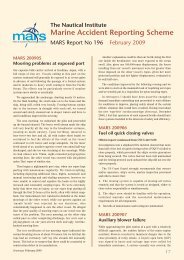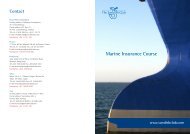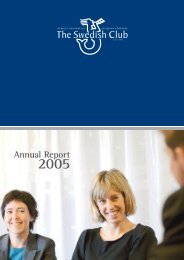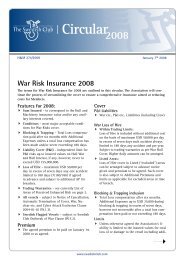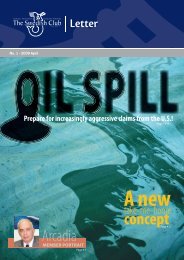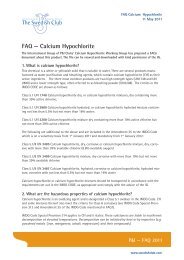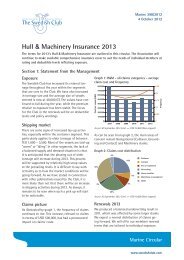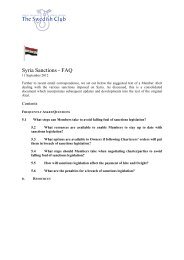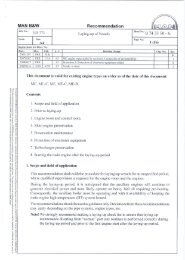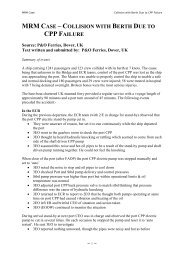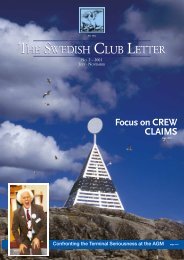List of Correspondents 2013 - The Swedish Club
List of Correspondents 2013 - The Swedish Club
List of Correspondents 2013 - The Swedish Club
You also want an ePaper? Increase the reach of your titles
YUMPU automatically turns print PDFs into web optimized ePapers that Google loves.
Advice to Masters concerning H&M insurance<br />
If and when a vessel encounters a situation where there is a need for outside assistance, owners<br />
and insurers rely heavily on the judgement <strong>of</strong> the master. It is the master who is on the scene and<br />
will have to decide if the danger to the vessel is such that outside assistance is needed to save the<br />
vessel, crew and its cargo. Unless the danger is imminent, it is strongly recommended that<br />
the master contacts the owners or insurers before any outside assistance is engaged.<br />
If a salvor <strong>of</strong>fers his services and demands a contract for the services rendered, the agreed<br />
contract should preferably be the LLOYD’S STANDARD FORM OF SALVAGE AGREEMENT "NO CURE<br />
- NO PAY" (LOF).<br />
This contract refers assessment <strong>of</strong> salvage remuneration to a Lloyd’s Arbitrator in London. <strong>The</strong><br />
purpose <strong>of</strong> an “open form” salvage contract is to avoid losing precious time haggling over the<br />
price <strong>of</strong> the service when a vessel is in imminent danger. It is, however, almost always more<br />
economical if the services are performed on a contract stipulating a fixed rate (hourly, daily or<br />
lump sum) rather than on an open form contract like the Lloyd’s Open Form (LOF).<br />
It is the master who decides when his vessel is in distress and in need <strong>of</strong> assistance. If the master<br />
decides that his vessel needs salvage services, it is the duty <strong>of</strong> all other parties involved to assist<br />
the master in his efforts to save, the vessel and find the best available means to secure the safety<br />
<strong>of</strong>, the vessel.<br />
When a master has accepted services from a salvor on either fixed terms or particularly if the<br />
services are performed under an open form contract, it is very important that the master and the<br />
crew keep a close record <strong>of</strong> what the salvors actually perform and under what circumstances.<br />
Although the crew and the salvors will represent two different sides in an arbitration, all salvage<br />
agreements, including the LOF, require full co-operation between the crew <strong>of</strong> the salved vessel<br />
and the salvors. To illustrate how an arbitrator will assess the salvors’ performance in an<br />
arbitration, we will list below the “criteria for fixing the reward” as set out in the LOF.<br />
1. <strong>The</strong> salved value <strong>of</strong> the vessel and other property;<br />
2. <strong>The</strong> skill and efforts <strong>of</strong> the salvors in preventing or minimising damage to the<br />
environment;<br />
3. <strong>The</strong> measure <strong>of</strong> success obtained by the salvor;<br />
4. <strong>The</strong> nature and degree <strong>of</strong> danger;<br />
5. <strong>The</strong> skill and efforts <strong>of</strong> the salvors in salving the vessel, other property and life;<br />
6. <strong>The</strong> time used and expenses and losses incurred by the salvors;<br />
7. <strong>The</strong> risk <strong>of</strong> liability and other risks run by the salvors or their equipment;<br />
8. <strong>The</strong> promptness <strong>of</strong> the services rendered;<br />
9. <strong>The</strong> availability and use <strong>of</strong> vessels or other equipment intended for salvage operations;<br />
10. <strong>The</strong> state <strong>of</strong> readiness and efficiency <strong>of</strong> the salvors’ equipment and the value there<strong>of</strong>.<br />
It is evident from the above that the information entered into the vessel’s logbook regarding<br />
weather conditions, actions taken by the crew to minimise dangers to vessel and cargo will be<br />
very important at a later stage when the means applied by the salvors are to be judged against<br />
the achieved results.<br />
<strong>The</strong> <strong>Swedish</strong> <strong>Club</strong> | 169



